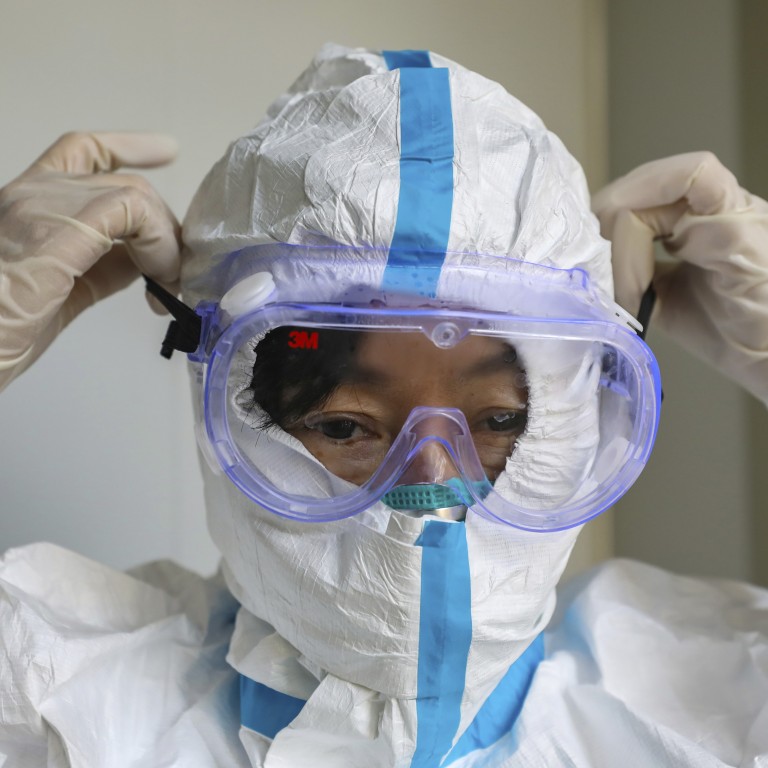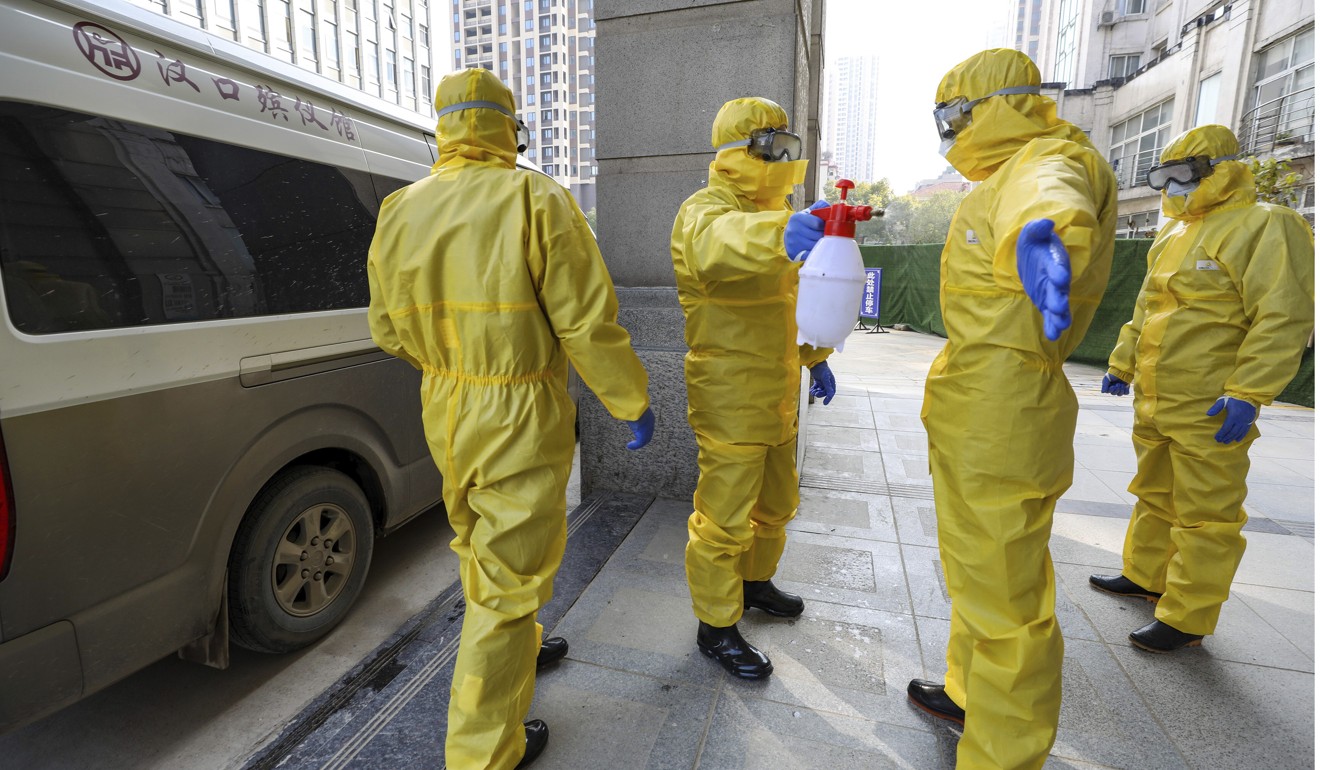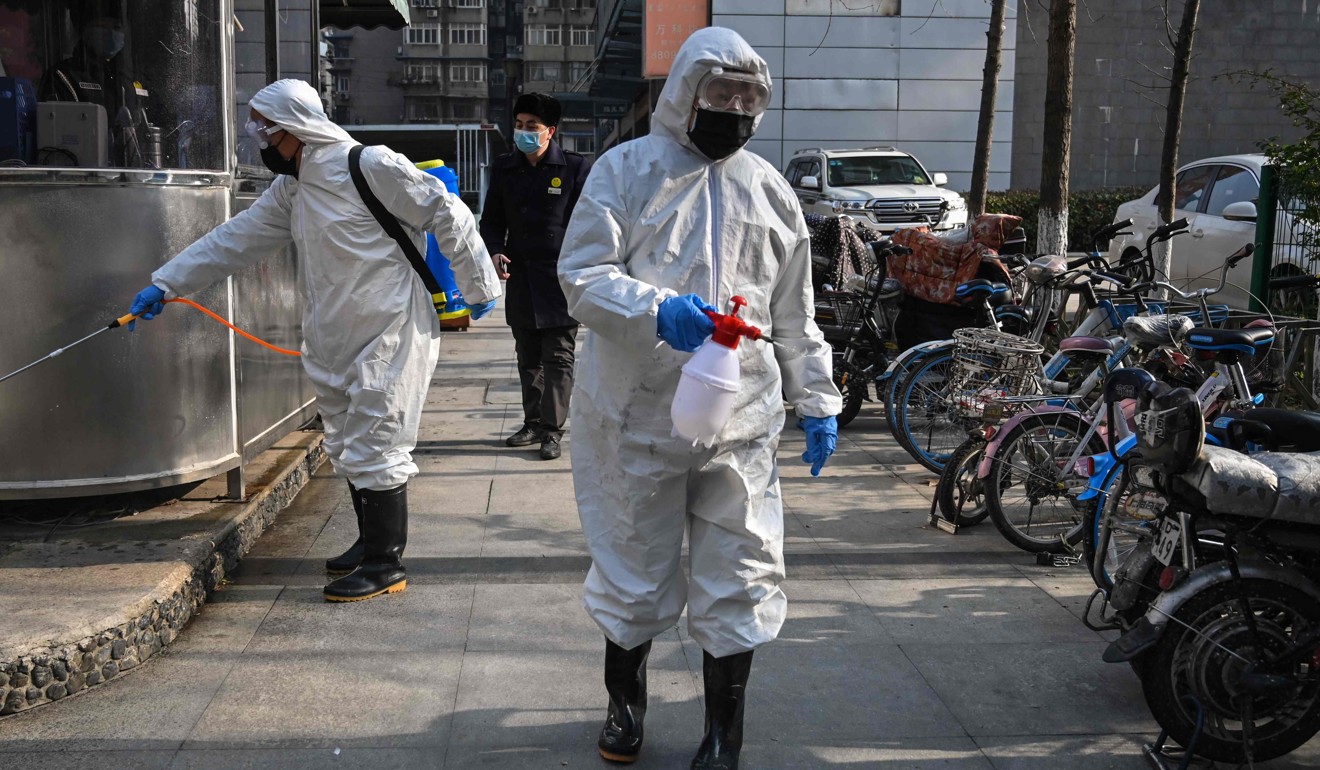
Coronavirus: China Red Cross under fire over poor distribution of masks, medical supplies
- The government is under growing pressure to relax restrictions on donations of masks and other items
- Beijing has ordered donations to be funnelled to five government-backed charity organisations while Hubei province remains under lockdown
The hashtag “Red Cross” has become the most searched topic on Weibo, China’s Twitter-like social media platform, with many asking: “Why are doctors still without protective gear after so many donations? Is [provincial capital] Wuhan a black hole?”
The government is under growing pressure to relax restrictions on public donations. On Wednesday, China’s civil affairs ministry announced that all public donations to Hubei had to be funnelled through five government-backed charity organisations, while Wuhan remained under lockdown with thousands of people infected by the deadly coronavirus.
The organisations are the Red Cross Society of Hubei, Hubei Charity General Association, their branches in Wuhan, and the Hubei Teenagers Development Foundation, which is affiliated with the Communist Party Youth League.
On social media people questioned why medical staff in the province were still facing a shortage of protective gear, despite donated items pouring in from other parts of China and overseas.
The desperate situation faced by doctors and nurses in Hubei became known to the Chinese public after hospitals bypassed the designated charity organisations and posted online appeals for donations for N95 masks, goggles, protective suits and gloves.
According to the National Health Commission in Beijing, 11,791 cases had been confirmed in China’s 31 provinces, municipalities and autonomous regions as of Friday. New deaths have brought the nationwide toll to 259.
Among them, Hubei reported 7,153 confirmed cases and 249 deaths. But officials warned that several cities in the vicinity were also hard hit. Nearby Huanggang already has 726 cases and officials have warned it could become the next Wuhan.
On Saturday, a social media user who combed through the donation and distribution information posted on the society’s website found that 16,000 N95 masks – which are in short supply and urgently needed by hospitals handling the virus – had been given to a private hospital specialising in cosmetic surgery and fertility treatment but that does not treat feverish patients.
Meanwhile, Wuhan Union Hospital, one of the hospitals dealing with the outbreak, received only 3,000 N95 masks. The allocation sparked speculation on social media that the hospital may have been “retaliated” against because it had bypassed the Red Cross and become one of the first hospitals to appeal for donations online.
The social media post which raised the issue touched off a firestorm. But it was not the first time the Red Cross Society in China had been in the hot seat.
In the wake of the 2008 earthquake in Sichuan province, the society was criticised for allegedly misusing public donations. Public mistrust remains although the organisation has tried hard to repair its tattered image in recent years.

The Hubei Red Cross issued a statement on Saturday in relation to the masks in question, saying it had misspelled KN95 as N95. According to the statement, a private company had donated 36,000 KN95 masks – which cannot be used as protective gear when handling communicable diseases – so it had decided to give them to two hospitals not involved in treating coronavirus patients.
But that was not enough to quell public anger. In a press conference on Saturday, Hubei vice-governor Li Qiang said the Red Cross lacked the efficiency to funnel supplies to the hospitals. But he added that medical staff remained short of protective gear partly because they had been used already, and partly because some of the donated items did not fit.
The Red Cross in Wuhan had received more than 9,000 boxes of masks, more than 70,000 protective clothes and more than 80,000 goggles, Li said.
China must contain the Wuhan virus, or the whole world will pay a price
As a whole, Wuhan had received 2.5 billion yuan (US$360 million) in cash donations, of which 841 million yuan had been spent, he said, adding that the Red Cross in Wuhan had received 600 million yuan in cash donations and spent 150 million yuan.
But the shortfall remains huge, even with the donations. Wuhan needs 3 million disposable protective suits a month, according to Wang Jiangping, China’s vice-minister of industry and information technology.
Workers in charity organisations and Chinese scholars said bottlenecks were created by the government’s desire to centralise the distribution of donations and supplies.
“The Red Cross in Hubei is not a big organisation and it is not good at handling this kind of logistics,” said one staff member of a charity organisation not among the five designated groups through which donations are being funnelled. “Many charity workers are now finding ways to bypass it to deliver supplies to the institutes in need.”
She said a special channel of approvals had been opened to facilitate imports of medical gear, and the main issue was to make sure the supplies reached the hospitals.
Many mainland media outlets joined in to slam the Red Cross and called for the government to resolve the bottleneck.
Taoran Notes, a popular social media site affiliated to the official Economic Daily newspaper, said there were mismatches in the distribution of medical supplies. But it also called for hospitals to contact government departments instead of appealing for donations online.
How the coronavirus is exposing the ills of the China model
According to mainland news portal Yicai.com, there are about a dozen staff in the Red Cross Society in Wuhan and two dozen in the Red Cross Society in Hubei. Some 30 civil servants have been seconded to help them and 50 volunteers have been recruited, but these numbers are still not enough to handle the vast need in the province.

The situation is even worse for small cities near Wuhan. A charity worker in Huangshi city, 94km (58 miles) away from Wuhan, said medical staff in the city had no protective suits or goggles.
“All they have are surgical masks. Those are not N95,” she said.
Some donors wanted to send supplies directly to hospitals, but their items were often intercepted by the Red Cross, as it was in charge of funnelling supplies by government directive, she said.
“That means the supplies will only go to institutes and places they deem important.”
Many online posts show hospitals sending staff to Red Cross offices to try and snatch supplies. A hospital worker in Huanggang said an employee was posted full-time in the city’s Red Cross office to liaise for supplies.
Singapore closes borders to all Chinese travellers to stem spread of coronavirus
Mainland scholars are calling on the government to decentralise the management of public donations in Hubei and allow civil society to play a role.
Ge Yunsong, a Peking University law professor, posted an article online in which he appealed to the Ministry of Civil Affairs to end the monopoly inherent in giving five organisations the power to distribute public donations.
“Other institutes, such as hospitals and individuals, also enjoy the right to receive donations,” he said.
He went on to suggest that some people may decide against donating because they mistrusted the five organisations.
But a hospital worker in Huanggang said making direct donations to hospitals posed another kind of problem.
“It really depends if the supplies meet the safety standards. If they are substandard or not the ones we want, they cannot protect us,” the person said on condition of anonymity.
Some donations, despite the good intentions of the donors, had turned out to be fake surgical masks, according to the charity worker in Huangshi.

